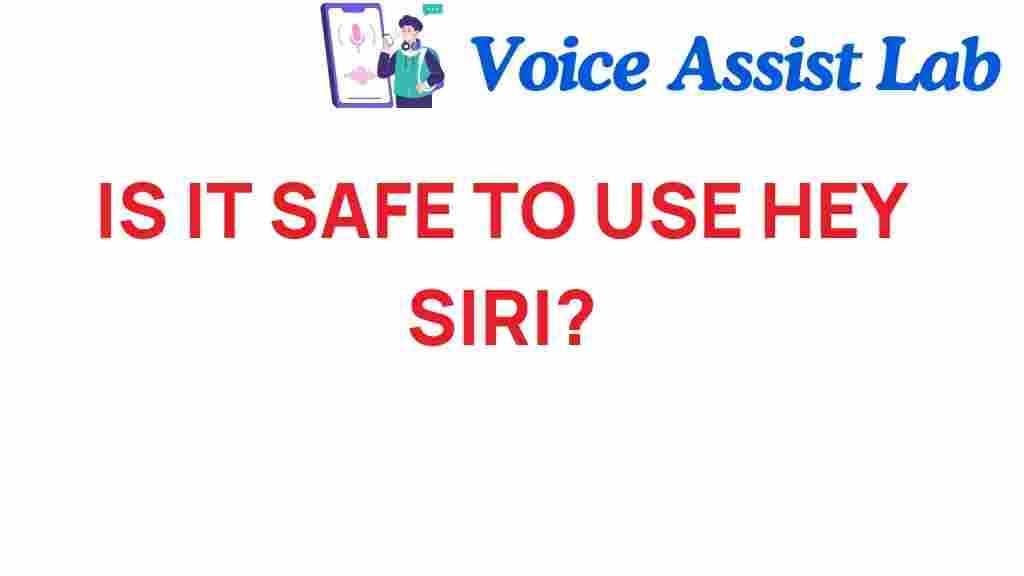Siri Privacy: Is It Safe to Use Hey Siri?
As voice assistants become increasingly integrated into our daily lives, many users are left wondering about the implications of using these technologies, particularly regarding their privacy. Apple’s Siri, one of the most popular voice assistants, enables users to perform tasks hands-free, but it also raises questions about data protection and digital security. This article will delve into the privacy concerns surrounding Siri and other voice assistants, exploring how they handle personal data, the importance of user consent, and tips for ensuring tech safety when using smart technology.
Understanding Siri and Voice Assistants
Voice assistants like Siri use voice recognition technology to interpret user commands and provide responses. These systems rely on advanced algorithms and machine learning to improve their accuracy and functionality over time. However, the very nature of how these assistants operate involves the collection and processing of personal data.
- Voice Recognition: Converts spoken words into text.
- Data Processing: Analyzes the text to determine user intent.
- Feedback Loop: Uses past interactions to enhance future responses.
While this technology offers convenience, it also poses risks. Users need to be aware of how their data is used and the potential for privacy breaches.
Privacy Concerns with Siri
When you use the phrase “Hey Siri,” your device is constantly listening for that wake word. This raises several privacy concerns:
- Constant Listening: Devices await activation, potentially capturing unintended conversations.
- Data Storage: Siri stores your voice recordings to improve service, raising questions about how long this data is kept.
- Third-Party Access: There is a risk of personal data being shared with third-party apps and services.
Data Protection Policies
Apple emphasizes its commitment to data protection and privacy. According to their policies:
- Data is anonymized to protect user identities.
- Users can manage their voice data through settings.
- Apple does not sell personal data to third parties.
However, despite these measures, concerns remain about the effectiveness of these policies and the potential for data breaches.
User Consent and Smart Technology
User consent is critical when using any smart technology. Users should be proactive in understanding what data is being collected and how it is used. Here are some steps to ensure that you are providing informed consent:
- Review privacy settings on your device regularly.
- Limit access to sensitive information (e.g., contacts, location).
- Disable features that you do not use or need.
Understanding these elements of tech safety is imperative for safeguarding your personal data.
How Siri Handles Personal Data
When you interact with Siri, the following happens:
- Activation: Upon hearing “Hey Siri,” your device starts processing your voice input.
- Data Transmission: Your voice data is sent to Apple’s servers for analysis.
- Response Generation: Siri generates a response based on your command and sends it back to your device.
This process raises questions about how secure the data transmission is and the risk of interception. Apple employs encryption to protect the data during transmission, but vulnerabilities can still exist.
Mitigating Privacy Risks
Here are some tips to enhance your digital security while using Siri:
- Regularly update your device to ensure the latest security patches are applied.
- Use strong, unique passwords for your Apple ID.
- Enable two-factor authentication for added security.
- Periodically review and delete Siri interaction history.
Troubleshooting Privacy Settings
If you’re concerned about your privacy settings with Siri, follow these steps:
- Open the Settings app on your iPhone or iPad.
- Select Siri & Search.
- Review the settings for Listen for “Hey Siri” and Press Home for Siri.
- Adjust Voice Feedback settings to your preference.
- Go to Privacy > Analytics & Improvements to manage data sharing options.
By actively managing these settings, you can enhance your Siri privacy and reduce the chances of unwanted data collection.
Alternatives to Siri
If you find the privacy concerns with Siri too alarming, consider exploring other voice assistants that prioritize data protection. Some alternatives include:
- Amazon Alexa: Offers various privacy controls and settings.
- Google Assistant: Provides robust privacy features, allowing users to manage their data effectively.
- Microsoft Cortana: Focuses on integrating productivity features with privacy settings.
Each of these alternatives comes with its own set of privacy policies and user controls, so it’s essential to do your research.
The Future of Voice Assistants and Privacy
As technology evolves, so do the capabilities of voice assistants. Privacy will continue to be a central concern for users. The industry is moving towards more transparent data practices, but users must remain vigilant about their personal data.
In the future, we can expect:
- Increased user control over data collection and sharing.
- Enhanced encryption methods to protect data during transmission.
- Greater emphasis on user consent and transparency in data practices.
Staying informed about these changes will help users maintain their privacy while enjoying the benefits of smart technology.
Conclusion
In conclusion, using **Hey Siri** does come with its set of privacy concerns, but with informed choices and proactive measures, users can mitigate risks associated with Siri privacy. Understanding how Siri handles personal data, ensuring user consent, and employing robust digital security practices are essential steps in enhancing your tech safety.
For more information on protecting your privacy and understanding voice assistants, check out this comprehensive guide on digital security. Remember, staying informed and aware is your best defense against privacy risks in the digital age.
This article is in the category Voice and created by VoiceAssistLab Team
